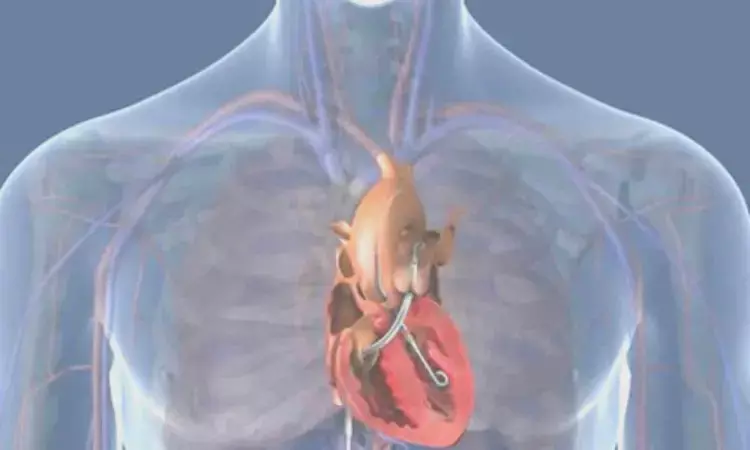- Home
- Medical news & Guidelines
- Anesthesiology
- Cardiology and CTVS
- Critical Care
- Dentistry
- Dermatology
- Diabetes and Endocrinology
- ENT
- Gastroenterology
- Medicine
- Nephrology
- Neurology
- Obstretics-Gynaecology
- Oncology
- Ophthalmology
- Orthopaedics
- Pediatrics-Neonatology
- Psychiatry
- Pulmonology
- Radiology
- Surgery
- Urology
- Laboratory Medicine
- Diet
- Nursing
- Paramedical
- Physiotherapy
- Health news
- Fact Check
- Bone Health Fact Check
- Brain Health Fact Check
- Cancer Related Fact Check
- Child Care Fact Check
- Dental and oral health fact check
- Diabetes and metabolic health fact check
- Diet and Nutrition Fact Check
- Eye and ENT Care Fact Check
- Fitness fact check
- Gut health fact check
- Heart health fact check
- Kidney health fact check
- Medical education fact check
- Men's health fact check
- Respiratory fact check
- Skin and hair care fact check
- Vaccine and Immunization fact check
- Women's health fact check
- AYUSH
- State News
- Andaman and Nicobar Islands
- Andhra Pradesh
- Arunachal Pradesh
- Assam
- Bihar
- Chandigarh
- Chattisgarh
- Dadra and Nagar Haveli
- Daman and Diu
- Delhi
- Goa
- Gujarat
- Haryana
- Himachal Pradesh
- Jammu & Kashmir
- Jharkhand
- Karnataka
- Kerala
- Ladakh
- Lakshadweep
- Madhya Pradesh
- Maharashtra
- Manipur
- Meghalaya
- Mizoram
- Nagaland
- Odisha
- Puducherry
- Punjab
- Rajasthan
- Sikkim
- Tamil Nadu
- Telangana
- Tripura
- Uttar Pradesh
- Uttrakhand
- West Bengal
- Medical Education
- Industry
Impella use during high-risk PCI leads to better survival and outcomes compared to IABP

USA: The use of Impella during the high-risk percutaneous coronary intervention (PCI) led to improved survival and less in-hospital myocardial infarction (MI) and cardiogenic shock compared with an intra-aortic balloon pump (IABP), researchers state in a recent study in the American Journal of Cardiology.
Impella received approval from the US Food and Drug Administration in 2015 for use during high-risk PCIs; however, its safety and efficacy compared with intra-aortic balloon pump remains debated and has not been evaluated in contemporary practice. Alexandra J. Lansky, Division of Cardiology, Yale School of Medicine, New Haven, Connecticut, and colleagues aimed to compare the real-world practice of the postapproval outcomes and costs of Impella versus IABP support for high-risk PCI across hospitals in the USA.
For this purpose, the researchers identified patients from the Premier Healthcare Database undergoing nonemergent Impella- or IABP-supported high-risk PCI. Propensity adjustment was used to control baseline, procedure, and post-PCI medical treatment differences between treatment groups.
Patients undergoing nonemergent single-PCI procedures with either Impella or IABP were included. Patients with acute ST-elevation myocardial infarction, cardiogenic shock, or needing >1 mechanical support device during the index hospitalization were excluded.
The outcomes were: myocardial infarction (MI), in-hospital survival, cardiogenic shock, bleeding requiring transfusion, stroke, index hospitalization length of stay, costs, and acute kidney injury. Forty-eight thousand one hundred seventy-nine patients were treated with Impella or IABP mechanical circulatory support from April 2016 to June 2019 in US hospitals. Out of these, the authors identified 2,156 patients undergoing nonemergent high-risk PCI treated with Impella (n = 1,447) or IABP (n = 709).
The study led to the following findings:
- After propensity adjustment, Impella use was associated with improved survival (odds ratio [OR] 1.55) and less MI (OR 0.29), and cardiogenic shock (OR 0.54).
- Stroke, bleeding requiring transfusion, and acute kidney injury was similar between groups.
- After adjustment, the mean hospital length of stay was 3.4 days with Impella and 4.8 days with IABP.
- Mean hospital costs were 37% higher with the PVAD ($48,784 vs. $35,655 with IABP).
- Among surviving patients, costs were 43% higher in the Impella group ($47,541 vs. $33,240 with IABP).
- Cardiogenic shock was the strongest predictor of in-hospital mortality (OR 7.54). Others included MI, stroke, and bleeding requiring transfusion.
The researchers conclude, "Impella use during nonemergent high-risk PCI was linked with improved survival and reduced in-hospital myocardial infarction and cardiogenic shock compared with an intra-aortic balloon pump."
Reference:
Lansky AJ, Tirziu D, Moses JW, Pietras C, Ohman EM, O'Neill WW, Ekono MM, Grines CL, Parise H. Impella Versus Intra-Aortic Balloon Pump for High-Risk PCI: A Propensity-Adjusted Large-Scale Claims Dataset Analysis. Am J Cardiol. 2022 Oct 6:S0002-9149(22)00950-X. doi: 10.1016/j.amjcard.2022.08.032. Epub ahead of print. PMID: 36210212.
Dr Kartikeya Kohli is an Internal Medicine Consultant at Sitaram Bhartia Hospital in Delhi with super speciality training in Nephrology. He has worked with various eminent hospitals like Indraprastha Apollo Hospital, Sir Gangaram Hospital. He holds an MBBS from Kasturba Medical College Manipal, DNB Internal Medicine, Post Graduate Diploma in Clinical Research and Business Development, Fellow DNB Nephrology, MRCP and ECFMG Certification. He has been closely associated with India Medical Association South Delhi Branch and Delhi Medical Association and has been organising continuing medical education programs on their behalf from time to time. Further he has been contributing medical articles for their newsletters as well. He is also associated with electronic media and TV for conduction and presentation of health programs. He has been associated with Medical Dialogues for last 3 years and contributing articles on regular basis.
Dr Kamal Kant Kohli-MBBS, DTCD- a chest specialist with more than 30 years of practice and a flair for writing clinical articles, Dr Kamal Kant Kohli joined Medical Dialogues as a Chief Editor of Medical News. Besides writing articles, as an editor, he proofreads and verifies all the medical content published on Medical Dialogues including those coming from journals, studies,medical conferences,guidelines etc. Email: drkohli@medicaldialogues.in. Contact no. 011-43720751


